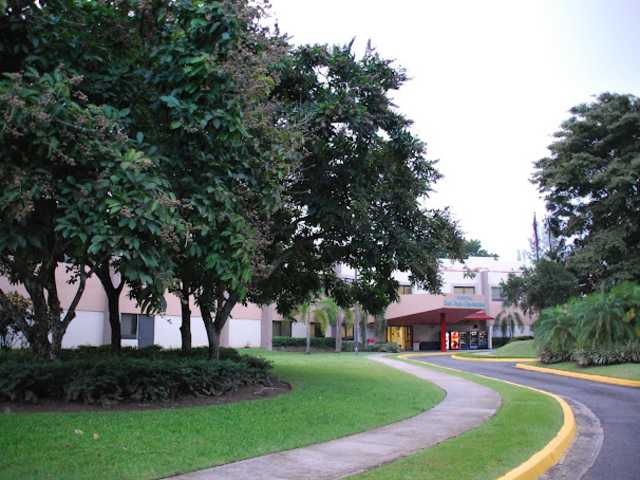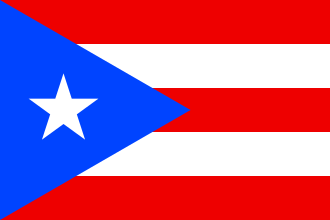
San Juan, Puerto Rico, Caribbean
San Juan Capestrano Hospital
Verified
Verified
This provider’s information has been quality-checked by Recovery.com’s Research Team for accuracy and completeness, including center verification through appropriate third-party organizations.
Joint Commission Accredited
The Joint Commission accreditation is a voluntary, objective process that evaluates and accredits healthcare organizations (like treatment centers) based on performance standards designed to improve quality and safety for patients. To be accredited means the treatment center has been found to meet the Commission's standards for quality and safety in patient care.
Provider's Policy
Please call our admissions team for more information on insurance coverage. A knowledgeable member of our team can answer any financial questions you might have, and they can also reach out directly to your insurance carrier to verify and maximize your benefits. This service is free and puts you under no obligation to choose our programming.
Estimated Cash Pay Rate
The cost listed here (Call for rates) is an estimate of the cash pay price. Center pricing can vary based on program and length of stay. Contact the center for more information. Recovery.com strives for price transparency so you can make an informed decision.
Highlights from the Center
Highlights
These highlights are provided by and paid for by the center.
Customized Treatment Plans
Holistic Approach
ALL Services On-Site
About San Juan Capestrano Hospital
At San Juan Capestrano Hospital, recovery begins with connection, compassion, and skilled care tailored to each client’s needs. Offering inpatient care, day treatment (PHP), and outpatient services across Puerto Rico, they help teens, adults, and seniors overcome mental health and addiction challenges. Through therapy, skill-building activities, and family support, each program helps clients rebuild daily habits and a sense of stability, preparing them to heal and thrive within their communities.
Develop Tools for Emotional and Relational Growth
Staff at San Juan Capestrano celebrate client strengths by setting personal goals, highlighting achievements, and encouraging new coping strategies that help individuals overcome emotional distress and substance use. Their approach includes medically supervised detox, medication management with psychiatric providers, and frequent individual and group therapy sessions. Family therapy supports healing relationships, while additional services like psychoeducation, relaxation techniques, and crisis management promote lasting recovery.
Discover Spaces that Promote Comfort and Renewal
Client rooms at San Juan Capestrano Hospital are designed for comfort and safety, offering space for personal belongings and a desk to encourage reflection. Beach murals bring a calming, coastal spirit to shared spaces, inspiring connection and peace. Clients can stay energized with basketball and ping pong or find renewal outdoors by the swimming pool, under gazebos, or along peaceful walking paths.
Maintain Progress with Continued Support
San Juan Capestrano understands that healing continues well beyond a client’s time in inpatient care. Discharge planning starts at admission, connecting clients to services like day treatment (PHP) and outpatient programs at the hospital and community-based therapy across Puerto Rico. These options offer ongoing support and structure, helping individuals maintain progress and confidently take the next steps toward long-term healing.
Read More
Insurance Accepted
Provider's Policy:Please call our admissions team for more information on insurance coverage. A knowledgeable member of our team can answer any financial questions you might have, and they can also reach out directly to your insurance carrier to verify and maximize your benefits. This service is free and puts you under no obligation to choose our programming.
Awaken Hope in Life’s Darkest Moments
San Juan Capestrano provides a safe place for healing when life feels overwhelming. Their team focuses on helping individuals who self-harm find stability through supportive care, therapeutic activities, and structured routines. By teaching healthy coping methods and rebuilding a sense of hope, the program helps clients take steps toward safety, strength, and a renewed future.
Build Confidence and Resilience with Teen-Specific Care
Adolescents regain stability and confidence through therapeutic support that encourages emotional healing, stronger relationships, and personal growth at San Juan Capestrano. With family sessions, skill-building groups, and attentive medication management, teens strengthen communication skills and emotional resilience. A structured environment with recreational spaces encourages connection and healing, preparing teens to thrive beyond treatment.
Find Relief and Renew Peace with ECT
Electroconvulsive therapy (ECT) at San Juan Capestrano Hospital offers rapid symptom relief for a wide range of mental health conditions and serves as a safe alternative to medication. Clients can access ECT during both inpatient and outpatient treatment. It is most effective when used alongside other therapies, particularly for individuals with treatment-resistant conditions.
Overcome Addiction with Strength and Support
San Juan Capestrano helps clients break free from addiction by providing peaceful, supervised spaces designed for privacy, safety, and rest during detoxification. Their program supports physical well-being through nutrition, occupational therapy, recreation therapy, and physical strengthening. Group therapy, psychiatrist sessions, and 12-Step meetings foster community and the development of healthy behaviors for lasting recovery.

Center Overview
Older Adults
Addiction and mental health treatment caters to adults 55+ and the age-specific challenges that can come with recovery, wellness, and overall happiness.
Adolescents
Teens receive the treatment they need for mental health disorders and addiction, with the added support of educational and vocational services.
Young Adults
Emerging adults ages 18-25 receive treatment catered to the unique challenges of early adulthood, like college, risky behaviors, and vocational struggles.
LGBTQ+
Addiction and mental illnesses in the LGBTQ+ community must be treated with an affirming, safe, and relevant approach, which many centers provide.
Midlife Adults
For adults ages 40+, treatment shifts to focus on the unique challenges, blocks, and risk factors of their age group, and unites peers in a similar community.
Veterans
Patients who completed active military duty receive specialized treatment focused on trauma, grief, loss, and finding a new work-life balance.

Treatment Focus
You can admit to this center with a primary substance use disorder or a primary mental health condition. You'll receive support each step of the way and individualized care catered to your unique situation and diagnosis.
Treatment
Specializations
Schizophrenia
Schizophrenia is a serious mental health condition that causes hallucinations, delusions, and disordered thinking.
Personality Disorders
Personality disorders destabilize the way a person thinks, feels, and behaves. If untreated, they can undermine relationships and lead to severe distress.
Anxiety
Anxiety is a common mental health condition that can include excessive worry, panic attacks, physical tension, and increased blood pressure.
Bipolar
This mental health condition is characterized by extreme mood swings between depression, mania, and remission.
Depression
Symptoms of depression may include fatigue, a sense of numbness, and loss of interest in activities. This condition can range from mild to severe.
Obsessive Compulsive Disorder (OCD)
OCD is characterized by intrusive and distressing thoughts that drive repetitive behaviors. This pattern disrupts daily life and relationships.
Self-Harm
The act of intentionally harming oneself, also called self-injury, is associated with mental health issues like depression.
Suicidality
With suicidality, a person fantasizes about suicide, or makes a plan to carry it out. This is a serious mental health symptom.
Treatment Services
Day Treatment
In a PHP, patients live at home but follow an intensive schedule of treatment. Most programs require you to be on-site for about 40 hours per week.
Intensive Inpatient
The highest level of care, medically managed intensive inpatient services provides 24-hour nursing and physician care.
Detox
Detox fully and safely removes toxic substances from the body, allowing the next steps in treatment to begin with a clean slate.
Intensive Outpatient Program
In an IOP, patients live at home or a sober living, but attend treatment typically 9-15 hours a week. Most programs include talk therapy, support groups, and other methods.
Licensed Primary Mental Health
Some primary care providers offer mental health diagnosis and treatment. This can prevent patients from developing more serious conditions.
Outpatient
During outpatient rehab, patients attend a structured treatment program while continuing to live at home.
Approaches
Evidence-Based
A combination of scientifically rooted therapies and treatments make up evidence-based care, defined by their measured and proven results.
Individual Treatment
Individual care meets the needs of each patient, using personalized treatment to provide them the most relevant care and greatest chance of success.
Medical
Medical addiction treatment uses approved medications to manage withdrawals and cravings, and to treat contributing mental health conditions.
Twelve Step
Incorporating spirituality, community, and responsibility, 12-Step philosophies prioritize the guidance of a Higher Power and a continuation of 12-Step practices.
Therapies
1-on-1 Counseling
Patient and therapist meet 1-on-1 to work through difficult emotions and behavioral challenges in a personal, private setting.
Family Therapy
Family therapy addresses group dynamics within a family system, with a focus on improving communication and interrupting unhealthy relationship patterns.
Nutrition Counseling
Nutritious food helps patients heal from within, setting them up for mental and bodily wellness as they learn about healthy eating.
Recreation Therapy
In recreation therapy, recovery can be joyful. Patients practice social skills and work through emotional triggers by engaging in fun activities.
Twelve Step Facilitation
12-Step groups offer a framework for addiction recovery. Members commit to a higher power, recognize their issues, and support each other in the healing process.
Conditions We Treat
Schizophrenia
Schizophrenia is a serious mental health condition that causes hallucinations, delusions, and disordered thinking.
Personality Disorders
Personality disorders destabilize the way a person thinks, feels, and behaves. If untreated, they can undermine relationships and lead to severe distress.
ADHD, ADD
ADHD is a common mental health condition caused by dopamine imbalance. Common symptoms include inattention, hyperactivitiy, and impulsivity.
Anger
Although anger itself isn't a disorder, it can get out of hand. If this feeling interferes with your relationships and daily functioning, treatment can help.
Anxiety
Anxiety is a common mental health condition that can include excessive worry, panic attacks, physical tension, and increased blood pressure.
Bipolar
This mental health condition is characterized by extreme mood swings between depression, mania, and remission.
Codependency
Codependency is a pattern of emotional dependence and controlling behavior. It's most common among people with addicted loved ones.
Depression
Symptoms of depression may include fatigue, a sense of numbness, and loss of interest in activities. This condition can range from mild to severe.
Eating Disorders
An eating disorder is a long-term pattern of unhealthy behavior relating to food. Most people with eating disorders have a distorted self-image.
Obsessive Compulsive Disorder (OCD)
OCD is characterized by intrusive and distressing thoughts that drive repetitive behaviors. This pattern disrupts daily life and relationships.
Substances We Treat
Alcohol
Using alcohol as a coping mechanism, or drinking excessively throughout the week, signals an alcohol use disorder.
Co-Occurring Disorders
A person with multiple mental health diagnoses, such as addiction and depression, has co-occurring disorders also called dual diagnosis.
Cocaine
Cocaine is a stimulant with euphoric effects. Agitation, muscle ticks, psychosis, and heart issues are common symptoms of cocaine abuse.
Drug Addiction
Drug addiction is the excessive and repetitive use of substances, despite harmful consequences to a person's life, health, and relationships.
Heroin
Heroin is a highly addictive and illegal opioid. It can cause insomnia, collapsed veins, heart issues, and additional mental health issues.
Prescription Drugs
It's possible to abuse any drug, even prescribed ones. If you crave a medication, or regularly take it more than directed, you may have an addiction.
Synthetic Drugs
Synthetic drugs are made in a lab, unlike plant-based drugs like mushrooms. Most synthetic drugs are either stimulants or synthetic cannabinoids.
Experience
Personal Amenities
Amenities
Activities
Learn more about San Juan Capestrano Hospital
We love hearing about your treatment experience
Help individuals and families seeking treatment by sharing your first-hand experience with this treatment provider. Review Guidelines.



















